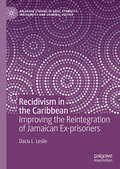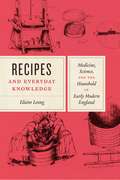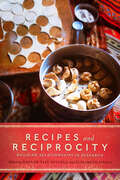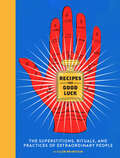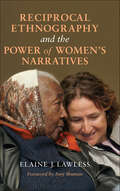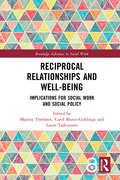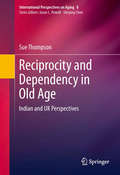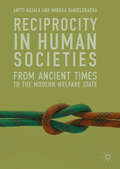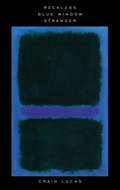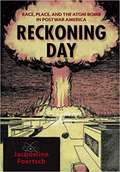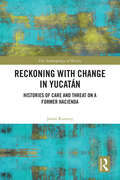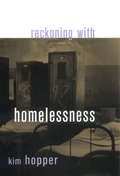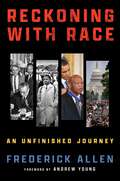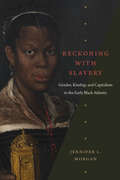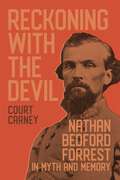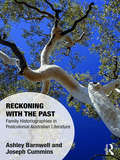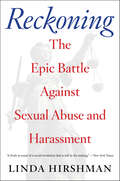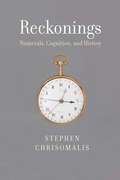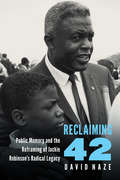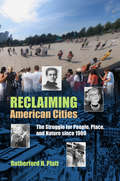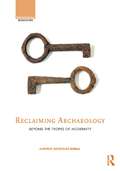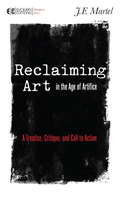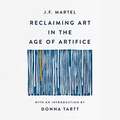- Table View
- List View
Recidivism in the Caribbean: Improving the Reintegration of Jamaican Ex-prisoners (Palgrave Studies in Race, Ethnicity, Indigeneity and Criminal Justice)
by Dacia L. LeslieThis book provides a detailed and practical exploration of criminal recidivism and social reintegration in Jamaica. It uses various methods to seek the authentic voices of inmates, ex-prisoners, deported migrants and practitioners, drawing on an original study to examine factors that might help ex-prisoners more successfully transition from a prison environment to life within the community. Leslie also raises important questions about the Jamaican state’s capacity to meet the needs of inmates, particularly as a large number of its citizens are subject to forced repatriation to their homeland by overseas jurisdictions due to their offending. Recidivism in the Caribbean provides a unique insight into institutional and community life in a post-colonial society, whilst linking practices theories of offender management. It will particularly appeal to criminologists and sociologists interested in tertiary crime prevention but also those interested in correctional policy and practice, punishment and deviance.
Recipes and Everyday Knowledge: Medicine, Science, and the Household in Early Modern England
by Elaine LeongAcross early modern Europe, men and women from all ranks gathered medical, culinary, and food preservation recipes from family and friends, experts and practitioners, and a wide array of printed materials. Recipes were tested, assessed, and modified by teams of householders, including masters and servants, husbands and wives, mothers and daughters, and fathers and sons. This much-sought know-how was written into notebooks of various shapes and sizes forming “treasuries for health,” each personalized to suit the whims and needs of individual communities. In Recipes and Everyday Knowledge, Elaine Leong situates recipe knowledge and practices among larger questions of gender and cultural history, the history of the printed word, and the history of science, medicine, and technology. The production of recipes and recipe books, she argues, were at the heart of quotidian investigations of the natural world or “household science”. She shows how English homes acted as vibrant spaces for knowledge making and transmission, and explores how recipe trials allowed householders to gain deeper understandings of sickness and health, of the human body, and of natural and human-built processes. By recovering this story, Leong extends the parameters of natural inquiry and productively widens the cast of historical characters participating in and contributing to early modern science.
Recipes and Reciprocity: Building Relationships in Research
by Hannah Tait Neufeld and Elizabeth Finnis;editorsRecipes and Reciprocity considers the ways that food and research intersect for both researchers, participants, and communities demonstrating how everyday acts around food preparation, consumption, and sharing can enable unexpected approaches to reciprocal research and fuel relationships across cultures, generations, spaces, and places. Drawing from research contexts within Canada, Cuba, India, Malawi, Nepal, Paraguay, and Japan, contributors use the sharing of food knowledge and food processes (such as drying, steaming, mixing, grinding, and churning) to examine topics like identity, community-based research ethics, food sovereignty, and nutrition. Each chapter highlights practical and experiential elements of fieldwork, incorporating storytelling, recipes, and methodological practices to offer insight into how food facilitates relationship-building and knowledge-sharing across geographical and cultural boarders. Contributors to this volume bring a range of disciplinary backgrounds—including anthropology, public health, social work, history, and rural studies—to the exploration of global and Indigenous foodways, perceptions around ethical eating and authenticity, language and food preparation, perspectives on healthy eating, and what it means to develop research relationships through food. Challenging colonial, heteropatriarchal, and methodological divisions between academic and less formal ways of knowing, Recipes and Reciprocity draws critical attention to the ways food can bridge disciplinary and lived experiences, propelling meaningful research and reciprocal relationships.
Recipes for Good Luck: The Superstitions, Rituals, and Practices of Extraordinary People
by Ellen WeinsteinA visual compendium of good luck habits implemented by influential people from history.What did Maya Angelou do to keep the words flowing? How do NASA engineers ensure a successful launch? What was Audrey Hepburn’s lucky number? How does Thom Yorke get ready for a concert? How did Björn Borg prepare for Wimbledon?This charmingly illustrated book reveals the real-life creative processes, superstitions, curious practices, and performance routines of influential leaders from every walk of life—artists, writers, scientists, politicians, musicians, actors, and more—who forged their own path and left an indelible mark on the world. It is a celebration of all the many weird and wonderful ways we find the courage to boldly go forth. So, get out there and start making some good luck of your own!
Reciprocal Ethnography and the Power of Women's Narratives
by Elaine J. LawlessFolklorist Elaine J. Lawless has devoted her career to ethnographic research with underserved groups in the American Midwest, including charismatic Pentecostals, clergywomen, victims of domestic violence, and displaced African Americans. She has consistently focused her research on women's speech in these contexts and has developed a new approach to ethnographic research which she calls "reciprocal ethnography," while growing a detailed corpus of work on women's narrative style and expressive speech. Reciprocal ethnography is a feminist and collaborative ethnographic approach that Lawless developed as a challenge to the reflexive turn in anthropological fieldwork and research in the 1970s, which was often male-centric, ignoring the contributions by and study of women's culture. Collected here for the first time are Lawless's key articles on the topics of reciprocal ethnography and women's narrative which influenced not only folklore, but also the allied fields of anthropology, sociology, performance studies, and women's and gender studies. Lawless's methods and research continue to be critically relevant in today's global struggle for gender equality.
Reciprocal Relationships and Well-being: Implications for Social Work and Social Policy (Routledge Advances in Social Work)
by Carol Munn-Giddings Maritta Törrönen Laura TarkiainenA sense of participation and opportunities to share and participate in activities or groups that are important to them are crucial factors in human wellbeing. This book provides a robust empirical and theoretical analysis of reciprocity and its implications for social work and social policy practices by discussing how ideas of reciprocity can be understood and applied to welfare policy and social care practices, as well as how the act of reciprocity supports the wellbeing of citizens. Contributions from Finland, Germany, Russia, the UK, the USA and Canada illuminate the ways in which socio-political contexts influence the power relations between citizens, practitioners and the state, and the potential (or otherwise) for reciprocity to flourish. It will be essential reading for social care practitioners, researchers and educationalists as well as postgraduate students in social work and related social care and community-oriented professions and social policy makers.
Reciprocity and Dependency in Old Age
by Sue ThompsonThis book highlights (1) the significance of reciprocity for the maintenance of self-esteem in old age and (2) the negative implications for the well-being of dependent older people when that significance goes unrecognized and, as a consequence, opportunities to give back to society, as well as take from it, are not facilitated by those in a position to do so. The discussion draws on research undertaken in the UK and Southern India into the extent to which having the self-perception of being valued in the world is important to older people in receipt of care support and whether, in their experience, this is recognized by others. The author presents an analysis of theoretical insights from leading thinkers across a broad range of literature and from several disciplines, including social theory, social work, philosophy, and gerontology. The author also gives voice to the perspectives of those dependent older people not often heard because of marginalizing and disempowering processes that contribute to their having little opportunity to be heard in the first place. The emphasis of this book is on aspiration to a meaningful life and continuing personal growth as offering a challenge to dominant discourses the equate old age with decline.
Reciprocity in Human Societies: From Ancient Times to the Modern Welfare State
by Antti Kujala Mirkka DanielsbackaPresenting new insights into reciprocity, this book combines Marcel Mauss’s well-known gift theory with Barrington Moore’s idea of mutual obligations linking rulers and the ruled. Teasing out the interrelatedness of these approaches, Reciprocity in Human Societies suggests that evolutionary psychology reveals a human tendency for reciprocity and collaboration, not only in a mutually cooperative way but also through increasing retributive moral emotions. The book discusses various historical societies and the different models of the current welfare state—Nordic (social democratic), conservative, and liberal— and the repercussions of the neoliberal policies of tax havens, tax cuts, and austerity with a cross-disciplinary approach that bridges evolutionary psychology, sociology, and social anthropology with history.
Reckless and Other Plays
by Craig LucasThis volume combines some of Craig Lucas' best known work, including Reckless ("a bittersweet fable for our time"--Frank Rich, The New York Times) and Blue Window (". . . the clarity of a Mozart quintet. And it is faultlessly spun. "--Dan Sullivan, The Los Angeles Times) with his newest play, Stranger. The three plays continue the author's exploration of the nature of relationships in an ever increasingly distant society. Craig Lucas is the author of Prelude to a Kiss, both a success on Broadway and as a motion picture, The Dying Gaul, God's Heart, Missing Persons and Longtime Companion. He is currently at work on numerous projects for theatre and film. Also available by Craig Lucas What I Meant Was: New Plays and Selected One Acts PB $17. 95 1-55936-159-X * USA Prelude to a Kiss and Other Plays PB $16. 95 1-55936-193-X * USA
Reckless and Other Plays
by Craig LucasThis volume combines some of Craig Lucas' best known work, including Reckless ("a bittersweet fable for our time"--Frank Rich, The New York Times) and Blue Window ("...the clarity of a Mozart quintet. And it is faultlessly spun."--Dan Sullivan, The Los Angeles Times) with his newest play, Stranger. The three plays continue the author's exploration of the nature of relationships in an ever increasingly distant society.Craig Lucas is the author of Prelude to a Kiss, both a success on Broadway and as a motion picture, The Dying Gaul, God's Heart, Missing Persons and Longtime Companion. He is currently at work on numerous projects for theatre and film.Also available by Craig Lucas What I Meant Was: New Plays and Selected One Acts PB $17.95 1-55936-159-X * USA Prelude to a Kiss and Other Plays PB $16.95 1-55936-193-X * USA
Reckoning Day: Race, Place, and the Atom Bomb in Postwar America
by Jacqueline FoertschToo often lost in our understanding of the American Cold War crisis, with its nuclear brinkmanship and global political chess game, is the simultaneous crisis on the nation's racial front. Reckoning Day is the first book to examine the relationship of African Americans to the atom bomb in postwar America. It tells the wide-ranging story of African Americans’ response to the atomic threat in the postwar period. It examines the anti-nuclear writing and activism of major figures such as W.E.B. Du Bois, Dr. Martin Luther King Jr., and Lorraine Hansberry as well as the placement (or absence) of black characters in white-authored doomsday fiction and nonfiction. Author Jacqueline Foertsch analyzes the work of African American thinkers, activists, writers, journalists, filmmakers, and musical performers in the "atomic" decades of 1945 to 1965 and beyond. Her book tells the dynamic story of commitment and interdependence, as these major figures spoke with force and eloquence for nuclear disarmament, just as they argued unstintingly for racial equality on numerous other occasions. Foertsch also examines the location of African American characters in white-authored doomsday novels, science fiction, and survivalist nonfiction such as government-sponsored forecasts regarding post-nuclear survival. In these, black characters are often displaced or absented entirely: in doomsday narratives they are excluded from executive decision-making and the stories' often triumphant conclusions; in the nonfiction, they are rarely envisioned amongst the "typical American" survivors charged with rebuilding US society. Throughout Reckoning Day, issues of placement and positioning provide the conceptual framework: abandoned at "ground zero" (America's inner cities) during the height of the atomic threat, African Americans were figured in white-authored survival fiction as compliant servants aiding white victory over atomic adversity, while as historical figures they were often perceived as "elsewhere" (indifferent) to the atomic threat. In fact, African Americans' "position" on the bomb was rarely one of silence or indifference. Ranging from appreciation to disdain to vigorous opposition, atomic-era African Americans developed diverse and meaningful positions on the bomb and made essential contributions to a remarkably American dialogue.
Reckoning Day: Race, Place, and the Atom Bomb in Postwar America
by Jacqueline FoertschToo often lost in our understanding of the American Cold War crisis, with its nuclear brinkmanship and global political chess game, is the simultaneous crisis on the nation's racial front. Reckoning Day is the first book to examine the relationship of African Americans to the atom bomb in postwar America. It tells the wide-ranging story of African Americans' response to the atomic threat in the postwar period. It examines the anti-nuclear writing and activism of major figures such as W.E.B. Du Bois, Dr. Martin Luther King Jr., and Lorraine Hansberry as well as the placement (or absence) of black characters in white-authored doomsday fiction and nonfiction. Author Jacqueline Foertsch analyzes the work of African American thinkers, activists, writers, journalists, filmmakers, and musical performers in the "atomic" decades of 1945 to 1965 and beyond. Her book tells the dynamic story of commitment and interdependence, as these major figures spoke with force and eloquence for nuclear disarmament, just as they argued unstintingly for racial equality on numerous other occasions. Foertsch also examines the location of African American characters in novels, science fiction, and survivalist nonfiction such as government-sponsored forecasts regarding post-nuclear survival. In these, black characters are often displaced or absented entirely: in doomsday narratives they are excluded from executive decision-making and the stories' often triumphant conclusions; in the nonfiction, they are rarely envisioned amongst the "typical American" survivors charged with rebuilding US society. Throughout Reckoning Day, issues of placement and positioning provide the conceptual framework: abandoned at "ground zero" (America's inner cities) during the height of the atomic threat, African Americans were figured in white-authored survival fiction as compliant servants aiding white victory over atomic adversity, while as historical figures they were often perceived as "elsewhere" (indifferent) to the atomic threat. In fact, African Americans' "position" on the bomb was rarely one of silence or indifference. Ranging from appreciation to disdain to vigorous opposition, atomic-era African Americans developed diverse and meaningful positions on the bomb and made essential contributions to a remarkably American dialogue.
Reckoning with Change in Yucatán: Histories of Care and Threat on a Former Hacienda (The Anthropology of History)
by Jason RamseyReckoning with Change in Yucatán engages with how best to look upon and respond to change, arguing that this debate is an important arena for negotiating local belonging and a force of transformation in its own right. For residents of Chunchucmil, a historic rural community in Yucatán, Mexico, history is anything but straightforward. Living in what is both a defunct 19th-century hacienda estate and a vibrant Catholic pilgrimage site, Chunchucmileños reckon past, present, and future in radically different ways. For example, while some use the aging estate buildings to weave a history of economic decline and push for revitalization by hotel developers, others highlight the growing fame of the Virgin of the Rosary in the attached church and vow to defend the site from developer interference. By exploring how past and future are channeled through changing built environments, landscapes, sacred relics, and legal documents, this ethnographic study details how the politics of change provide Chunchucmileños with a common language for debating commitments to place and each another in the present. Against Western notions of ‘History’ as a relatively coherent account of change, the book suggests we reframe it as an ongoing performance that is always fractured, democratic, and morally tinged.
Reckoning with Homelessness
by Kim Hopper"It must be some kind of experiment or something, to see how long people can live without food, without shelter, without security."--Homeless woman in Grand Central StationKim Hopper has dedicated his career to trying to address the problem of homelessness in the United States. In this powerful book, he draws upon his dual strengths as anthropologist and advocate to provide a deeper understanding of the roots of homelessness. He also investigates the complex attitudes brought to bear on the issue since his pioneering fieldwork with Ellen Baxter twenty years ago helped put homelessness on the public agenda.Beginning with his own introduction to the problem in New York, Hopper uses ethnography, literature, history, and activism to place homelessness into historical context and to trace the process by which homelessness came to be recognized as an issue. He tells the largely neglected story of homelessness among African Americans and vividly portrays various sites of public homelessness, such as airports. His accounts of life on the streets make for powerful reading.
Reckoning with Race: An Unfinished Journey
by Frederick AllenIn his fifty-year career as an award-winning journalist, CNN commentator, and author of multiple books, Rick Allen has had a front-row seat on dramatic change in race relations in America. In this collection of eighteen essays, he explores his ongoing efforts to understand the struggle of black and white Americans to navigate a shared history at once wicked and intimate, full of love and hate, as they seek to level an uneven playing field. Allen examines issues from the era of Reconstruction through Jim Crow, the Civil Rights movement, the rhythms of resistance and progress, into today&’s contentious debates over redlining, reparations, and critical race theory. Starting as a reporter with the Atlanta Constitution in 1972, Allen got to know and befriend legendary black political figures including Julian Bond, John Lewis, Andy Young, Hosea Williams, Maynard Jackson, Jesse Jackson, and Daddy King, the father of Martin Luther King, Jr. He also encountered ardent white segregationists, some of whom saw the light and others who took their racism to the grave. Drawing on his experience covering politics, he examines presidents from LBJ and Jimmy Carter to Obama and Trump. He explores the symbolism of Confederate flags, the controversy over Uncle Remus, the election of Atlanta&’s first black mayor, Maynard Jackson, and the tragic case of the Atlanta Child Murders. He has had first-hand encounters with white supremacy and violent black protest alike. Throughout his essays, Allen is candid about his own shortcomings as a white native Northerner learning gradually about the complexities of race in his adoptive South. The essays highlight his continuing journey toward understanding the forces that both hinder and promote equality and harmony between the races.
Reckoning with Slavery: Gender, Kinship, and Capitalism in the Early Black Atlantic
by Jennifer L. MorganIn Reckoning with Slavery Jennifer L. Morgan draws on the lived experiences of enslaved African women in the sixteenth and seventeenth centuries to reveal the contours of early modern notions of trade, race, and commodification in the Black Atlantic. From capture to transport to sale to childbirth, these women were demographically counted as commodities during the Middle Passage, vulnerable to rape, separated from their kin at slave markets, and subject to laws that enslaved their children upon birth. In this way, they were central to the binding of reproductive labor with kinship, racial hierarchy, and the economics of slavery. Throughout this groundbreaking study, Morgan demonstrates that the development of Western notions of value and race occurred simultaneously. In so doing, she illustrates how racial capitalism denied the enslaved their kinship and affective ties while simultaneously relying on kinship to reproduce and enforce slavery through enslaved female bodies.
Reckoning with the Devil: Nathan Bedford Forrest in Myth and Memory
by Court CarneyCourt Carney’s Reckoning with the Devil grapples with the troubled, complex legacy of Nathan Bedford Forrest—a slave trader, Confederate general, and prominent Klansman. More than a century after his death, Forrest’s image continues to resonate with certain groups and bear varied interpretations, reflecting the intricate interplay of history, memory, and a contested past. Carney explores how historical omissions and erasures continually reshape perceptions of Forrest as well as the Civil War.Central to Forrest’s narrative is his involvement in the slave trade, a key to his ascent in the southern social hierarchy. Carney traces Forrest’s trajectory from a prosperous slave trader in Memphis to a politician and eventual military leader in the Confederacy during the Civil War. Forrest’s postwar years reveal his struggle to rebuild his life, leading him to engage in various economic ventures and eventually join the Ku Klux Klan. Carney argues that the slave trade, the Fort Pillow massacre, and his Klan affiliation were the fundamental elements shaping Forrest’s image. Those elements, although steeped in racism and white supremacy, were marked by an ambiguity and malleability that allowed Forrest to attract admirers as well as detractors as his image was memorialized in postwar white southern culture.Carney covers distinct phases of Forrest’s memorialization, from the unveiling of statues in Memphis in 1905 to his representation in literature and media and the controversies surrounding his monuments in the 2010s. That history culminates with the removal of the Memphis statue in 2017, reflecting the evolving societal perspectives on symbols tied to racism. Forrest’s significance lies in his capacity to encompass conflicting narratives—hero and villain, rebel and patriot. Carney contends that understanding Forrest’s legacy is essential for comprehending the intricacies of the southern past and its enduring impact on American society. By exploring the fluidity of Forrest’s image, Carney’s work illuminates the nuanced interplay of history, memory, and the ongoing struggle to reckon with a tumultuous past.
Reckoning with the Past: Family Historiographies in Postcolonial Australian Literature (Memory Studies: Global Constellations)
by Joseph Cummins Ashley BarnwellThis is the first book to examine how Australian fiction writers draw on family histories to reckon with the nation’s colonial past. Located at the intersection of literature, history, and sociology, it explores the relationships between family storytelling, memory, and postcolonial identity. With attention to the political potential of family histories, Reckoning with the Past argues that authors’ often autobiographical works enable us to uncover, confront, and revise national mythologies. An important contribution to the emerging global conversation about multidirectional memory and the need to attend to the effects of colonisation, this book will appeal to an interdisciplinary field of scholarly readers.
Reckoning: The Epic Battle Against Sexual Abuse and Harassment
by Linda HirshmanThe first history—incisive, witty, fascinating—of the fight against sexual harassment, from the author of the New York Times bestseller Sisters in LawLinda Hirshman, acclaimed historian of social movements, delivers the sweeping story of the struggle leading up to #MeToo and beyond: from the first tales of workplace harassment percolating to the surface in the 1970s to the Clinton/Lewinsky scandal—when liberal women largely forgave Clinton, giving men a free pass for two decades. Many liberals even resisted the movement to end rape on campus. And yet, legal, political, and cultural efforts, often spearheaded by women of color, were quietly paving the way for the takedown of abusers and harassers. Reckoning delivers the stirring tale of a movement catching fire as pioneering women in the media exposed the Harvey Weinsteins of the world, women flooded the political landscape, and the walls of male privilege finally began to crack. This is revelatory, essential social history.
Reckonings: Numerals, Cognition, and History
by Stephen ChrisomalisInsights from the history of numerical notation suggest that how humans write numbers is an active choice involving cognitive and social factors.Over the past 5,000 years, more than 100 methods of numerical notation--distinct ways of writing numbers--have been developed and used by specific communities. Most of these are barely known today; where they are known, they are often derided as cognitively cumbersome and outdated. In Reckonings, Stephen Chrisomalis considers how humans past and present use numerals, reinterpreting historical and archaeological representations of numerical notation and exploring the implications of why we write numbers with figures rather than words.
Reclaiming 42: Public Memory and the Reframing of Jackie Robinson's Radical Legacy
by David NazeReclaiming 42 centers on one of America’s most respected cultural icons, Jackie Robinson, and the forgotten aspects of his cultural legacy. Since his retirement in 1956, and more strongly in the last twenty years, America has primarily remembered Robinson’s legacy in an oversimplified way, as the pioneering first black baseball player to integrate the Major Leagues. The mainstream commemorative discourse regarding Robinson’s career has been created and directed largely by Major League Baseball (MLB), which sanitized and oversimplified his legacy into narratives of racial reconciliation that celebrate his integrity, character, and courage while excluding other aspects of his life, such as his controversial political activity, his public clashes with other prominent members of the black community, and his criticism of MLB. MLB’s commemoration of Robinson reflects a professional sport that is inclusive, racially and culturally tolerant, and largely postracial. Yet Robinson’s identity—and therefore his memory—has been relegated to the boundaries of a baseball diamond and to the context of a sport, and it is within this oversimplified legacy that history has failed him. The dominant version of Robinson’s legacy ignores his political voice during and after his baseball career and pays little attention to the repercussions that his integration had on many factions within the black community.Reclaiming 42 illuminates how public memory of Robinson has undergone changes over the last sixty-plus years and moves his story beyond Robinson the baseball player, opening a new, broader interpretation of an otherwise seemingly convenient narrative to show how Robinson’s legacy ultimately should both challenge and inspire public memory.
Reclaiming American Cities: The Struggle for People, Place, and Nature since 1900
by Rutherford H. PlattFor most of the past century, urban America was dominated by top-down policies serving the white business and cultural elite, the suburbs, and the automobile. At times these approaches were fiercely challenged by reformers such as Jane Addams and Jane Jacobs. Yet by the 1980s, mainstream policies had resulted in a nation of ravaged central cities, sprawling suburbs, social and economic polarization, and incalculable environmental damage. In the 1990s, this entrenched model finally yielded to change as local citizens, neighborhood groups, and other stakeholders, empowered by a spate of new laws and policies, began asserting their own needs and priorities. Though hampered by fiscal crises and internal disagreements, these popular initiatives launched what the author terms a new era of "humane urbanism" marked by a determination to make cities and suburbs greener, healthier, safer, more equitable, more efficient, and generally more people-friendly. In the process, the mayors, architects, engineers, and bureaucrats who had previously dominated urban policy found themselves relegated to supporting roles. As Rutherford H. Platt points out, humane urbanism can take many forms, from affordable housing and networks of bike paths to refurbished waterfronts and urban farms. Often spontaneous, low-tech, and self-sustaining programs, their shared goal is to connect people to one another and to bring nature back into the city. Reclaiming American Cities examines both sides of this historic transformation: the long struggle against patricians and technocrats of earlier decades and the recent sprouting of grassroots efforts to make metropolitan America more humane and sustainable.
Reclaiming Archaeology: Beyond the Tropes of Modernity (Archaeological Orientations)
by Alfredo González-RuibalArchaeology has been an important source of metaphors for some of the key intellectuals of the 20th century: Sigmund Freud, Walter Benjamin, Alois Riegl and Michel Foucault, amongst many others. However, this power has also turned against archaeology, because the discipline has been dealt with perfunctorily as a mere provider of metaphors that other intellectuals have exploited. Scholars from different fields continue to explore areas in which archaeologists have been working for over two centuries, with little or no reference to the discipline. It seems that excavation, stratigraphy or ruins only become important at a trans-disciplinary level when people from outside archaeology pay attention to them and somehow dematerialize them. Meanwhile, archaeologists have been usually more interested in borrowing theories from other fields, rather than in developing the theoretical potential of the same concepts that other thinkers find so useful. The time is ripe for archaeologists to address a wider audience and engage in theoretical debates from a position of equality, not of subalternity. Reclaiming Archaeology explores how archaeology can be useful to rethink modernity’s big issues, and more specifically late modernity (broadly understood as the 20th and 21st centuries). The book contains a series of original essays, not necessarily following the conventional academic rules of archaeological writing or thinking, allowing rhetoric to have its place in disclosing the archaeological. In each of the four sections that constitute this book (method, time, heritage and materiality), the contributors deal with different archaeological tropes, such as excavation, surface/depth, genealogy, ruins, fragments, repressed memories and traces. They criticize their modernist implications and rework them in creative ways, in order to show the power of archaeology not just to understand the past, but also the present. Reclaiming Archaeology includes essays from a diverse array of archaeologists who have dealt in one way or another with modernity, including scholars from non-Anglophone countries who have approached the issue in original ways during recent years, as well as contributors from other fields who engage in a creative dialogue with archaeology and the work of archaeologists.
Reclaiming Art in the Age of Artifice
by J. F. MartelPart treatise, part critique, part call to action, Reclaiming Art in the Age of Artifice is a journey into the uncanny realities revealed to us in the great works of art of the past and present. Received opinion holds that art is culturally-determined and relative. We are told that whether a picture, a movement, a text, or sound qualifies as a "work of art" largely depends on social attitudes and convention. Drawing on examples ranging from Paleolithic cave paintings to modern pop music and building on the ideas of James Joyce, Oscar Wilde, Gilles Deleuze, Carl Jung, and others, J.F. Martel argues that art is an inborn human phenomenon that precedes the formation of culture and even society. Art is free of politics and ideology. Paradoxically, that is what makes it a force of liberation wherever it breaks through the trance of humdrum existence. Like the act of dreaming, artistic creation is fundamentally mysterious. It is a gift from beyond the field of the human, and it connects us with realities that, though normally unseen, are crucial components of a living world. While holding this to be true of authentic art, the author acknowledges the presence--overwhelming in our media-saturated age--of a false art that seeks not to liberate but to manipulate and control. Against this anti-artistic aesthetic force, which finds some of its most virulent manifestations in modern advertising, propaganda, and pornography, true art represents an effective line of defense. Martel argues that preserving artistic expression in the face of our contemporary hyper-aestheticism is essential to our own survival. Art is more than mere ornament or entertainment; it is a way, one leading to what is most profound in us. Reclaiming Art in the Age of Artifice places art alongside languages and the biosphere as a thing endangered by the onslaught of predatory capitalism, spectacle culture, and myopic technological progress. The book is essential reading for visual artists, musicians, writers, actors, dancers, filmmakers, and poets. It will also interest anyone who has ever been deeply moved by a work of art, and for all who seek a way out of the web of deception and vampiric diversion that the current world order has woven around us.From the Trade Paperback edition.
Reclaiming Art in the Age of Artifice
by J. F. MartelA compelling call to rediscover the transformative power of art in an age of distraction, coercion and spectacle - with a new introduction by Donna TarttIn Reclaiming Art in the Age of Artifice, J. F. Martel offers a compelling and incisive meditation on the nature of art in a world dominated by invasive media, rampant consumer culture, and artificial intelligence. Drawing on a wide range of examples, from Paleolithic cave art to contemporary cinema, Martel argues that true art reveals the unseen forces shaping our existence-forces that transcend politics, technology, and even culture. In contrast to artifice, which seeks to manipulate or distract, authentic art calls us back to the essence of things, opening "rifts" onto the sublime and the weird and reconnecting us with the radical mystery at the heart of the world.Featuring a foreword by Pulitzer Prize-winning author Donna Tartt, this edition also includes a new afterword by the author, reflecting on the continued relevance of art in our increasingly mediated world.
